THE

••• A CALL TO PRAYER (PAGE 4) ••• INTERNATIONAL CHRISTIAN EMBASSY JERUSALEM // JULY 2023 // USA EDITION
RICH BIBLICAL SIGNIFICANCE OF THE Feasts OF THE LORD
FROM JERUSALEM
The International Christian Embassy Jerusalem was established in1980 in recognition of the biblical significance of all of Jerusalem and its unique connection to the Jewish people. Today the ICEJ represents millions of Christians, churches, and denominations to the nation and people of Israel. We recognize in the restoration of Israel the faithfulness of God to keep His ancient covenant with the Jewish people. Our main objectives are:
• To stand with Israel in support and friendship;
• To equip and teach the worldwide church regarding God’s purposes with Israel and the nations of the Middle East;
• To be an active voice of reconciliation between Jews, Christians, and Arabs, and to support the churches and congregations in the Holy Land.
From its head offices in Jerusalem, the ICEJ reaches out into more than 170 countries worldwide, with branch offices in over 90 nations.
Our vision is:
• To reach every segment of Israel’s society with a Christian testimony of comfort and love, and
• To reach and actively represent to Israel the support of denominations, churches, and believers from every nation on earth.
The Christian Embassy is a non-denominational faith-based ministry supported by the voluntary contributions of our partners and friends across the globe. We invite you to join with us as we minister to Israel and the Jewish people worldwide by donating to the ongoing work and witness of the ICEJ.


WORD
CREDITS

ICEJ President Dr. Jürgen Bühler
USA Director Susan Michael
VP International Affairs Dr. Mojmir Kallus
VP Finance David van der Walt
VP Operations Barry R. Denison

VP International Spokesman David Parsons
VP AID & Aliyah Nicole Yoder
Managing Editor/Publications Director Laurina Driesse
USA Managing Editor Karen Engle
Staff Writer Anastasiya Gooding
Graphic Design/Illustrators Ryan Tsuen, Peter Ecenroad, Nancy Schimp
Photography Shutterstock, Adobe Stock, AP, AFP, JAFI, Flash90, Haaretz, Reuters, IDF, businessweek.com, Netafim, newatlas, SanDisk, Watergen, Waze, Wikimedia Commons, Levi Dörflinger, ICEJ Staff and Branches
The New King James Bible is used for all Bible references unless otherwise noted.
Word From Jerusalem is published by the International Christian Embassy Jerusalem. Reproduction in whole or in part without written permission is prohibited. Word From Jerusalem has no subscription price and is supported through contributions worldwide. The ICEJ USA Branch is a 501(c)(3) non-profit organization with offices in Tennessee, Florida, and Washington, DC. All gifts to this ministry are tax-deductible according to United States law.
INTERNATIONAL CHRISTIAN EMBASSY JERUSALEM - USA
Support our ministry online at: www.icejusa.org
FROM THE PRESIDENT'S DESK
Dear friends,
As I write this, Israel is witnessing the highest surge in Jewish immigration in 30 years—a miracle in our day, to be sure! However, this excitement over the rising number of new arrivals is mixed with concerns about what is driving Jews to return home from around the world. On pages 10-11 of this month’s Word From Jerusalem, you’ll read more about the crises behind much of the immigration happening now and why Christians must stand with and pray for the Jewish people and help bring these sons and daughters of Israel home as soon as possible.
Once they arrive in the Land, new immigrants face a long journey of absorbing into life in Israel—they must learn a new language, find jobs, and integrate into a culture. This is particularly challenging for Ethiopians immigrants. In our article “Aliyah Village Offers Ethiopian Immigrants Soft Landing in Israel” on pages 12-13, you’ll read about a unique absorption center in rural Northern Israel, “Beit Alfa,” that helps ease Ethiopian immigrants into their new life.
In my article “A Call to Prayer over the Battle for Israel’s Future,” I address the heated national debate over judicial reforms and how much power Israel’s Supreme Court should have, a debate that has resulted in months of protests still happening in Israel. And on pages 6–7, you’ll read about the feasts of the Lord—what they are and why they matter for modern-day Christians.
As you read this issue, I pray you will be encouraged by what God is doing in our day—and what is yet to come—and invite you to join us in building God’s kingdom here in Israel!
Many blessings from Jerusalem!
Dr. Juergen Buehler President International Christian
Embassy Jerusalem
COVER PHOTO: Shofar and Scripture (Adobe Stock)

FOR MAGAZINE ARCHIVES
visit www.icejusa.org/wfj
THE RICH BIBLICAL SIGNIFICANCE OF THE Feasts OF THE LORD A CALL TO PRAYER (PAGE 4) INTERNATIONAL CHRISTIAN EMBASSY JERUSALEM // JULY 2023 // USA EDITION FROM JERUSALEM
FROM JERUSALEM





CONTENTS JULY 2023 USA EDITION 11 FEATURED TEACHING A CALL TO PRAYER 4 THE RICH BIBLICAL SIGNIFANCE OF THE FEASTS OF THE LORD 6 9 AT-RISK CHILDREN LAUNCH A BUSINESS 10 ALIYAH TO ISRAEL HITS 30-YEAR PEAK! 14 HAIFA HOME RESIDENTS DELIGHT IN NEW EXPERIENCES!
A CALL TO PRAYER Over the Battle for Israel’s Future
BY DR. JUERGEN BUEHLER, PRESIDENT INTERNATIONAL CHRISTIAN EMBASSY JERUSALEM
While Israel celebrates its 75th anniversary year, the Jewish State has found itself in possibly the greatest internal crisis since the establishment of Israel in 1948. In early January, the heated national debate over judicial reforms drew masses of demonstrators into the streets. While the new government was hoping the protests would fade out over time, the opposite has taken place—the protests have grown not only in number but also intensity.

Major highways in and between Tel Aviv and Jerusalem have been blocked multiple times, causing havoc for many commuters. In a more serious development, hundreds of Israeli reserve soldiers, particularly in such elite units as air force pilots and intelligence officers, refused to show up at their bases for their annual “miluim” (reserve duty) every soldier in Israel is asked to fulfill until age 40. Hi-tech leaders here in the renowned Start-Up Nation have divested hundreds of millions of dollars out of their Israeli accounts to foreign banks. According to some bankers, upwards of $4 billion has been removed from the country, partly in protest and partly in fear of Israel’s economic future.
At the end of March, the national unrest reached a dangerous peak as the Histadrut, Israel’s national workers’ union, called for crippling nationwide strikes to stop the judicial reforms. Most notably, Ben Gurion Airport—Israel’s main international air hub—temporarily stopped all flights abroad. In addition, Israel’s diplomatic corps
around the world halted their work. Talk of a “civil war” has been heard with frightening frequency. Without a doubt, this is one of the most critical moments in Israel’s modern history.
So what is at stake that would cause such a large portion of this nation to sacrifice their time and energy to stop what they see as a “coup”? Emotions are indeed high! Some observers of this turmoil, including many pro-Israel Christians, reduce the anti-reform protests to a mere showdown between liberal, secular Tel Aviv and religious Jerusalem or between leftists and conservatives. Others oversimplify matters by pointing to Israeli Prime Minister Benjamin Netanyahu as the problem. For certain, these issues are relevant to the debate, but the current crisis goes much deeper.
Interestingly, most Israelis would generally welcome a set of measured, common-sense judicial reforms. President Isaac Herzog, the former chairman of the left-leaning Labor party, supports judicial reforms, as does Yair Lapid, chairman of Yesh Atid, the main opposition party that started the protests in January. Even the previous Bennett-Lapid government was working on similar judicial reforms and could have enacted them if it had maintained its Knesset majority. So why, then, the protests?
Aside from the usual party politics and the anti-Bibi sentiments, there are two main reasons why an increasing number of
Israelis from all walks of life, both secular and religious, are showing up at protests and calling for reforms based on a broader consensus. Even within Netanyahu’s own Likud party, more and more voices are calling for a compromise.
The issue at stake is how much power should the Supreme Court have and how should the Court’s justices be appointed. And here nearly everyone agrees: Israel’s unelected judges have too much power over laws, even basic laws, passed by the democratically elected Knesset. They get too deeply involved in political matters and they are appointed by a majority of fellow judges with only limited say for the Knesset. All this should now change.
Yet most Israelis today also fear that the currently proposed judicial reforms will swing the pendulum of power from one extreme to another. Power will go from primarily liberal judges into the hands of the most religious, right-wing government Israel has ever had. If the main judicial reforms pass—curbing the power of the courts to review and strike down bad laws—a second tier of proposed laws is waiting in the queue, raising serious fears of religious coercion. There could be new religious restrictions on who can immigrate to Israel and forced observance of Sabbath and Kosher regulations. Women could face imprisonment for exposing their elbows at the Western Wall Plaza. The death penalty could return for certain crimes, and Israeli doctors could be encouraged
4 | JULY 2023 ICEJ COMMENTARY
to give preference to Jews before gentiles. This is without mentioning the dangerous anti-missionary law that could have led to believers in Jesus being imprisoned simply for sharing their faith. Thank God many of these laws were already declared nonstarters, but they do reflect the leanings of the current government.
The big question confronting all sides in this crisis is what the future of the Jewish State will look like. It is true that most of those protesting would identify as Zionists. This is particularly true for the elite soldiers who refuse service. These courageous men and women are willing to sacrifice their lives for the survival of the State of Israel. Also, most of the protesters want Israel to be a Jewish State as Theodor Herzl envisioned. A home for Jews from around the world to seek refuge. A place where being Jewish is not a badge of shame but one of honor. A nation that celebrates Jewish holidays and where on Yom Kippur over 80% of Israelis are voluntarily fasting and even more stop driving their cars.
The question, however, is how forceful would the “Jewishness” imposed by the State be upon its citizens? Or how much freedom would each citizen have to express his own Jewishness in daily life?
Over the past decades, Israel mastered this balancing act with incredible finesse. On the one side, it allowed maximum freedom of expression by all its citizens, yet at the same time, it protected the right of the ultraOrthodox Jewish community to have gendersegregated classes, for example. Some areas in Israel are off limits on Shabbat to any type of traffic, while in other parts of the country, you find busy shopping malls packed with cars and people on Saturdays. Most Israelis today, even among the religious, would like to retain these individual freedoms in Israel. And here, the Supreme Court justices were often the moderating voice that guaranteed this sociological diversity between the ultraOrthodox and the ultra-secular.
There is one more facet of this debate that concerns many Israelis, and it might even be the core issue: demographics. The ultraOrthodox community in Israel has grown from a few hundred adherents at the time of Israel’s founding under David Ben Gurion to around 14% of Israel’s population some 75 years later. And the future trend looks no different. Today, 25% of all Israeli firstgraders attend haredi (ultra-Orthodox) schools. A popular chant at the anti-reform protests is “de-mo-kat-ya” (democracy), but it should rather be “de-mo-graph-ya,” insists one astute rabbi, because the fear is that if the haredi community keeps growing faster than everyone else and the judicial reforms
are passed as is, Israel’s face will change from a liberal Jewish democracy to becoming a religious theocracy.
It is a fact that Israel’s ultra-Orthodox community carries only 2% of the national tax burden, even while it consumes 40% of the social welfare benefits. This is while ultraOrthodox children are exempted from serving in the army. Therefore, many Israelis resent the haredi flaunting of the old social compact, which demands that every Israeli pay their fair share of taxes and send their sons and daughters to the army. It also upsets them to hear haredi politicians accuse IAF pilots of being “unpatriotic” for not showing up for reserve duty. To be clear, most Israelis respect the ultra-Orthodox community as the guardians of Jewish religious traditions, but they are afraid that the judicial reforms would empower the ultra-religious right to rob them of the freedoms and liberties for which many Israelis fought and died for in countless wars.
With the above in mind, a Christian leader recently asked me: “Wouldn’t it be wonderful if all Israel was forced to live according to God’s commandments?” I do not believe so! Our own Christian history shows that devout and well-meaning religious leaders do not always make for good politicians. For a short time, the revival in Geneva once led by John Calvin birthed a short but glorious period when Geneva was called “the city of God.” Yet it ended up in a draconian rule by religious leaders where children were encouraged to spy on and betray their parents should they sin. Similar stories are reported from Florence, Italy, under the reformer Savagnola. And when Martin Luther’s Reformation brought forth the first Protestant state in Germany, it led to the killing of tens of thousands of Baptists as “heretics” by Luther’s Reformed church.
While I am convinced that these medieval examples will not be repeated by the Jewish State, it does teach us that overly religious leaders often overrule the conscience of a nation. The hope the Bible gives us is that ultimate freedom, righteousness, and justice will only be accomplished by the One who will sit on the throne of David and govern His people with equity and justice.
Israel’s prophets gave the world what we today consider the proper division of governmental powers. In Isaiah 33:22, the prophet says: “For the Lord is our Judge, the Lord is our Lawgiver, the Lord is our King; He will save us.” The early Reformers said only a perfect God can properly exercise these three powers of making laws (legislature), judging (judiciary), and serving as King (executive). We humans are too sinful and corrupt for one man to hold all these powers. And this is what is at stake in Israel today.
Therefore, Israel today finds itself at a critical and complex juncture this 75th birthday year. It needs our prayers more than ever before, as this time will truly shape the future of Israel.
SO HOW SHALL WE PRAY FOR ISRAEL IN THESE CHALLENGING DAYS?
Pray for the political and religious leaders of Israel to have wisdom and grace to restore the unity of the nation. This is essential, as Jesus Himself said a kingdom divided against itself cannot stand (Mark 3:24). Jewish tradition says that it was sinat achim—the hatred between brothers—that led to the Roman exile. Please pray according to Psalm 133:1, which says: “Behold, how good and how pleasant it is for brethren to dwell together in unity!”
I am intrigued that Abraham was 75 years old when he, as the father of faith, entered the Land of Promise (Genesis 12). Let us pray that Israel will enter her spiritual inheritance as a nation. Pray that out of this chaos, Israel will emerge as a light to the nations. Pray that this difficult time will cause a time of Israel seeking God—and God answering by pouring out the Spirit of grace and supplication upon Israel (Zechariah 12:10ff).
Pray for Prime Minister Netanyahu, that God will give him wisdom to rule this nation in righteousness and justice: “Give the king Your judgments, O God, and Your righteousness to the king’s Son. He will judge Your people with righteousness, and Your poor with justice” (Psalm 72:1–2); “The king’s heart is in the hand of the Lord, like the rivers of water; He turns it wherever He wishes” (Proverbs 21:1).
Pray for Israel’s security, as some of her adversaries have sensed the vulnerability of the Jewish State amid this internal turmoil: “Behold, He who keeps Israel shall neither slumber nor sleep” (Psalm 121:4).
ICEJ COMMENTARY
5 |WORD FROM JERUSALEM
THE RICH BIBLICAL SIGNIFICANCE OF THE Feasts OF THE LORD


Understanding God’s Appointed Times (Series)
KAREN
ENGLE, ICEJ USA MANAGING EDITOR
In his letters to the early church, the apostle Paul often mentions “the word of God,” “Scripture,” or “the Scriptures.” For example, in Hebrews 4:12 he says that the “word of God is living and powerful” and in 2 Timothy 3:16–17 writes that “All Scripture is given by inspiration of God.”
At the time Paul was writing, the New Testament had not yet been penned, so the only Scripture to which he could have been referring was the Old Testament—in Hebrew, the Tanakh, which stands for the Law, the Prophets, and the Writings.
Jesus, too, referred to “the Scriptures” long before the New Testament was written. He was living it! Shortly after His resurrection, He appeared to two of His disciples on the road to Emmaus, about seven miles from Jerusalem. Not recognizing Him, they updated this “fellow traveler” about the things that had taken place over the previous few days—Jesus’ crucifixion and burial—and how this man whom they had believed would redeem Israel according to the Prophets was now dead.
Jesus responded by using the Old Testament to remind the two men what their Scriptures said concerning their Messiah:
O foolish ones, and slow of heart to believe in all that the prophets have spoken! Ought not the Christ to have suffered these things and to enter into His glory?” And beginning at Moses and all the Prophets, He expounded to them in all the Scriptures the things concerning Himself. (Luke 24:25–26)
Later in Jerusalem, as those two men from Emmaus recounted the experience to the eleven disciples and others with them, Jesus Himself stood amid them and said: “These are the words which I spoke to you while I was still with you, that all things must be fulfilled which were written in the Law of Moses and the Prophets and the Psalms concerning Me” (vv. 44–45). Then He opened their minds so they could understand what was written in the Scriptures—that the Messiah would suffer and rise from the dead on the third day and repentance would be preached in His Name to all nations, beginning with Jerusalem.
ICEJ TEACHING
6 | JULY 2023
No one knows the details of what exactly Jesus expounded to them that day—only that the two disciples confessed that as Jesus “opened their mind so they could understand the Scriptures,” their hearts were “burning within” them (v. 32 NIV).
But I’m convinced that among many other prophecies about Himself, Jesus could have been pointing them to Leviticus 23 and the feasts of the Lord.
What Are the Feasts?
At this point, many Bible readers might bow out, convinced Leviticus is a book reserved for the scholarly sort. But I have found studying the feasts to be one of the most powerful and impactful things I’ve ever done as a believer. Why? Because every feast God established in Leviticus 23 points to Jesus, and altogether, they paint a glorious picture of God’s plan of redemption over all time.
In this series on the feasts, we’ll explore what this means and how learning about the feasts deepens our understanding of God’s redemptive work. But before we do that, we must first unpack what they are.
The feasts are primarily found in Leviticus 23, Numbers 28, and Deuteronomy, but they undergird the whole of Scripture. However, the most logical place to start when first learning about them is in Leviticus 23:1–2:
Speak to the children of Israel, and say to them: “The feasts (mo’ed) of the Lord, which you shall proclaim to be holy convocations (quodesh miqra), these are My feasts.”
The English word “feast” makes it easy to assume they involve gathering for a hearty meal. Although some feasts indeed involve food, the Lord’s feasts are a much deeper activity in the Bible and hold a more profound meaning. So let’s unpack this verse.
word quodesh, which means, “set apart.” And the word “convocation” in Hebrew is the word miqra, which means, “a public meeting or a rehearsal.” Thus, God’s feasts are set-apart appointments on His calendar meant to be something practiced
Who Are the Feasts For?
Notice in Leviticus 23:1–2 God says these appointments are “His” feasts. Though God initiated the feasts with the Jewish people, and though they are often referred to as the feasts of Israel, God clearly states they are “My feasts.” And He initiated them for a great purpose.
In Hebrew the word “feast” is the word mo’ed (pronounced “mow-ed”), and it means “an appointment or a fixed time or season; also a signal.” Think of your calendar and any appointments you might have on it—a visit to the doctor, for example. When you make an appointment, the doctor expects you to keep it. Only in this case, God set these “appointments” with the Israelites long ago, and He expected them to keep them.
The feasts spanned springtime through the fall and formed Israel’s annual lifecycle. They commemorated God’s faithfulness and reminded Israel who He was and what His character was like—and of their impurity. They were special times God set apart to meet with His people so that they could draw near to and worship Him.
But Leviticus 23:2 gives us even more insight. God calls His feasts “holy convocations.” In Hebrew, “holy” is the
Even the sun, moon, and stars have a Goddesigned purpose related to these “feasts.” Consider Genesis 1:14, where God says:
Let there be lights in the firmament of the heaven to divide the day from the night and let them be for signs (owth) and for seasons (mo’ed) and for days, and years.
The word “signs” in Hebrew is owth, which means a signal, a distinguishing mark, or proof. And “seasons” is that same Hebrew word mo’ed—a fixed time or season or an appointment.
God established the sun, moon, and stars in the heavens to operate as they do for timekeeping, so Israel would know when each feast was to occur—and to act as a signal, mark, or proof of something. Knowing this, let’s look ahead to the New Testament and some interesting wording Paul uses in his letter to the Colossians:
ICEJ TEACHING
Present GOD’S FEASTS “Appointments” Christ’s First Coming Christ’s Second Coming Fulfilled in Past Fulfilled in Future SPRING FEASTS Passover Unleavened Bread (March/April) Pentecost (May/June) Firstfruits (March/April) Shabbat FALL FEASTS Trumpets (September/October) Tabernacles (September/October) Yom Kippur (September/October) 50Days
ARE SET-APART APPOINTMENTS ON HIS CALENDAR MEANT TO BE SOMETHING PRACTICED. 7 |WORD FROM JERUSALEM
Shabbat Shabbat Shabbat Shabbat
GOD’S FEASTS
Therefore do not let anyone judge you by what you eat or drink, or with regard to a religious festival (a feast day), a New Moon celebration or a Sabbath day. These are a shadow of the things that were to come; the reality, however, is found in Christ (Colossians 2:16–17, emphasis added)
Some versions say, “the substance is found in Christ.” The Lord’s feasts (which include the weekly Sabbath, as well as new moon celebrations) are a mere shadow according to Paul—a type or a picture—of the reality, the “substance” found in Christ. Think of a musical theater production. In many dress rehearsals, the cast repeatedly practices their songs, acts, and dances to be fully prepared for their real performance in front of a live audience. God intended His feasts to be like a dress rehearsal, something to be practiced repeatedly but that were never the “real thing.” They always pointed to the true thing of substance: Jesus.
This truth should make every Christian want to discover what these feasts are, because understanding the “shadow of the things to come”—Jesus—will naturally bring greater understanding of His life and ministry.
What Are the Feasts?
Though there are other feasts in Scripture, like Purim (which Mordecai initiated in the book of Esther to celebrate the Jewish people’s victory over Haman) and the Feast of Dedication or “the Festival of lights,” otherwise known as Hanukkah (which began after the temple menorah oil miraculously stayed lit for eight days during the time of the Maccabean revolt when there was only enough for one day), God’s feasts were initiated by Him in Leviticus 23. This does not mean Purim and Hanukkah are not important feasts for the Jewish people! Even Jesus celebrated Hanukkah (see John 10:22). However, God lists His feasts in Leviticus 23 as:
Out of His seven feasts, God set apart three “primary” feasts—Passover, Pentecost, and Tabernacles—where He required Israelite men to celebrate the feast “at the place in which He chooses.” Initially that “place” was in Shiloh in the tabernacle, but later, it was at the temple in Jerusalem:
Three times a year all your males shall appear before the LORD your God in the place which He chooses: at the Feast of Unleavened Bread, at the Feast of Weeks, and at the Feast of Tabernacles; and they shall not appear before the LORD emptyhanded. (Deuteronomy 16:16; see also Exodus 23:4–17)
These three special or “pilgrimage” feasts each represented significant encounters with God in the lives of His covenant people. The feasts also were intimately connected with ancient Israel’s agricultural calendar, which bursts with messianic significance. Passover, Firstfruits, and Pentecost occurred in the spring and were rehearsals for the first coming of Jesus. Trumpets, Day of Atonement, and Tabernacles, occurring in the fall, point to His second coming. (See chart on page 7.)
Between spring and fall, of course, are the summer months, indicative of the church age, the “times of the gentiles”—a season when Scripture says the Jewish people’s eyes would be veiled and hearts partially hardened to who Jesus is but also when Jerusalem would be under gentile sovereignty. From Jerusalem’s fall in AD 70 (some believe as far back as Israel’s exile to Babylon and the First Temple’s destruction in 586 BC) to the rebirth of the State of Israel in 1948, Jerusalem has indeed been under gentile control. But we are living in a new era, and for the first time in almost 2,000 years, Jerusalem is again under Jewish governance. The tide of the times of the gentiles is turning, and the feasts can teach us much about what comes next.
A Picture of the Work of Jesus
Too often Christians skip over Leviticus in the Old Testament because it seems antiquated or difficult, with so many sacrifices and offerings and rules. They ignore the feasts believing they are Jewish and not something to be concerned with. The feasts were, after all, like visual aids for the Jewish people meant to point them to their Messiah. However, when believers overlook the feasts, they miss something beautiful—and I believe what Jesus may have been unpacking for those two men on the road to Emmaus.
Because each feast portrays a particular aspect of Jesus’ life and ministry and altogether paint a complete picture of His
work, understanding them sheds incredible light on His first coming, His return, and everything in between—as well as the significant theme of seventh-day rest in the Bible. We live in a generation that can look back at Jesus’ life, death, and resurrection and see how He indeed fulfilled each of the three spring feasts and the weekly Sabbath. (We’ll learn more about how in a future article.) Because He fulfilled those feasts perfectly, we can trust He will fulfill the fall feasts to exact perfection too. And for that reason, we should run to study them to better understand what’s ahead for us—and importantly, the nation of Israel.
Keep learning about the significance of God’s feasts in the August issue of Word From Jerusalem, when we will introduce the fall feasts, beginning with Feasts of Trumpets.
WHO KEPT THE FEASTS IN THE BIBLE
Though God initiated the Feasts in the Old Testament with the nation of Israel, in the New Testament, we see that Jesus kept the Feasts—as did His parents, the apostle Paul, and the disciples:
Luke 2:41: His parents went to Jerusalem every year at the Feast of the Passover.
John 2:13: Now the Passover of the Jews was at hand, and Jesus went up to Jerusalem.

John 5:1: After this there was a feast of the Jews, and Jesus went up to Jerusalem.
1 Corinthians 5:8: Therefore let us [Paul and others] keep the feast, not with old leaven, nor with the leaven of malice and wickedness, but with the unleavened bread of sincerity and truth.
Acts 2:1: When the Day of Pentecost had fully come, they [the disciples] were all with one accord in one place.
Acts 18:21: When they asked him [Paul] to stay a longer time with them, he did not consent, but took leave of them, saying, “I must by all means keep this coming feast in Jerusalem.”
Acts 20:16 (see also Acts 16:8): For Paul had decided to sail past Ephesus, so that he would not have to spend time in Asia; for he was hurrying to be at Jerusalem, if possible, on the Day of Pentecost.
8 | JULY 2023 ICEJ TEACHING
1. The Weekly Sabbath (Shabbat)
2. Passover/Unleavened Bread (Pesach) – Pilgrimage
3. Firstfruits (Hanafat Ha’omer)
4. Pentecost, or the “Feast of Weeks” (Shavuot) – Pilgrimage
5. Trumpets (Yom Teruah)
6. Day of Atonement (Yom Kippur)
7. Tabernacles (Sukkot) – Pilgrimage
At-Risk Children
Launch a Business and a New Season of Life
 BY ANNALIESE JOHNSON, ICEJ PUBLICATIONS / EVENTS REGISTRATION
BY ANNALIESE JOHNSON, ICEJ PUBLICATIONS / EVENTS REGISTRATION

In May an ICEJ delegation was invited to take part in one of the most anticipated life events of every Jewish youth—their bar or bat mitzvah. This important rite of passage grants recognition to Jewish boys and girls that they are now responsible members of the Jewish community. For eight young Jews in the Beit Appel Youth Village, a home founded in 1954 for youth from troubled backgrounds, this was a special achievement. Known as the Kvutzat Dekel (“Palm Tree Group”), the young teens could not contain their excitement as they looked forward to this next stage in life.
Much of the excitement was due to a joint ICEJ-Beit Appel project at the Youth Village that started last year. The project aims to bring to fruition the dream of launching a youth-operated bakery in the village. In the confectionery kitchen funded by the Christian Embassy, children from the home have been working hard to not only learn how to bake but get the business off the ground. They have spent countless hours in the kitchen and the classroom learning how to bake, prepare packages for sale, and run their own business. Each village event, including this group bar mitzvah, provides an opportunity to showcase their new skills.
As our ICEJ team entered the gate and waved to the security guard on duty, we were instantly immersed in a haven filled with greenery and colorful artwork. We made our way on a dirt path through a jungle-like nature area until we found the celebration under a partially covered
patio. There were decorated tables, scrumptiouslooking desserts, Israeli pop music, a slideshow, and about 150 excited guests ready to celebrate with the eight youths.
The children, thrilled with their major achievement, smiled and whispered among themselves as they laid out delicate and delightful desserts on the tables. As part of their training, they baked gooey brownies, carefully frosted cakes, and creamy custards— perfect treats for the sweet celebration of a key milestone. We watched as they pulled older siblings to the dessert table and eagerly pointed out which desserts they had shaped. One mischievous three-year-old boy with his hair tied in a bun raced around the center collecting desserts with pride for his mother and grandmother.

Maya Cohen, director of the youth program, beamed while explaining the success of the bakery project and how proud she was of the children’s dedication. Whereas just a year prior she knew none of their names due to being brand new on staff, she joyfully exclaimed: “Now, they are my children! You can see [the exuberance] on my face!”
Maya says that moving forward, she hopes to operate the baking classes multiple times weekly and open sales to not only the village and staff but also the surrounding community. Besides Maya, we also meet Oly Kenneth, ecological director of the center, as we admired the workmanship displayed on the dessert
tables. Seven years ago, this part of the village was the garbage dump, complete with trash, broken dishwashers, old washing machines, and stench. However, volunteers from the village turned it into an oasis of 350 handplanted trees, mainly organic fruit trees that offer free produce for all who enter the complex.
Oly shared, “For me this is the dream! The dream is here! It is their home! These same kids planted the trees here, and now they are having their party here! It came full circle.”
ICEJ staff member Irene smiled and referenced Isaiah 61:3, which eloquently describes beauty replacing ashes for troubled hearts. And for ICEJ AID staff member Jannie, “the icing on the cake” was when each youth was recognized on stage and the support system they shared. Dressed in white, they stood bravely in front of 150 family members, counselors, and role models and sang a beautiful song. When one nervous boy struggled to get the words out, the other seven crowded around him, linking arms and smiling in genuine love.
When Jannie was asked to address the gathering, she said that she was reminded of Psalm 92:12, which mentions the righteous flourishing like a palm tree, befitting for the “Palm Tree Group.” In addition to creating delicious desserts, she noted that they made lasting memories and gained valuable skills that will be very beneficial in their future lives. As one speaker at the celebration expressed: “The beauty has no end.”
ICEJ AID
Donate to www.icejusa.org/aid 9 |WORD FROM JERUSALEM
ALIYAH TO ISRAEL HITS 30-YEAR PEAK!

Join the ICEJ’s Urgent Efforts to Bring Jews Home from All Directions
BY DAVID PARSONS, ICEJ VICE PRESIDENT & SENIOR SPOKESMAN
“Fear not, for I am with you; I will bring your descendants from the east, and gather you from the west; I will say to the north, ‘Give them up!’ and to the south, ‘Do not keep them back!’ Bring My sons from afar, and My daughters from the ends of the earth.
(Isaiah 43:5–6)
Israel is witnessing the highest surge in Jewish immigration in 30 years, and the Aliyah wave is still building. But excitement over the rising number of new arrivals is also mixed with concerns about the urgent crises now driving Jews to return home from around the world.


In early June authorities released the latest Aliyah figures showing that over 100,000 new immigrants have arrived in Israel since the start of 2022, marking the highest number since the mass Soviet Jewish influx three decades ago. Over these past 17 months, some 60,000 Jewish immigrants have come from Russia, 20,000 from Ukraine, and the remaining 20,000 from other countries worldwide.
Aliyah from the North
Much of the current surge in immigration to Israel was sparked by the Russian invasion of Ukraine in February 2022. Over 80,000 Russianspeaking Jews have moved to Israel in the 17 months since. About one-quarter fled the war in Ukraine, but surprisingly, the vast majority are arriving from Russia and other former Soviet states to escape the economic impact and other uncertainties brought on by the conflict.
This mass stream of Aliyah from the north shows no sign of letting up, so the ICEJ will continue to sponsor urgent Aliyah flights from these regions in the months ahead. We also have three large Aliyah camps planned this summer for Jewish youths from the Baltic states (Latvia, Lithuania, and Estonia) and Ukraine to help prepare them for life in Israel.
The International Christian Embassy Jerusalem is doing our part to help bring as many of these Jewish families as possible home to Israel. Our current efforts are focused on Russia, Ukraine, the Baltic states, and other former Soviet republics, plus Ethiopia and the Bnei Menashe from India.

So far this year, supporters of the Christian Embassy have funded over 1,120 Aliyah flights while helping another 1,500 Jewish immigrants with other stages of their move to Israel. Our actual flight numbers this year include 180 from Ukraine, 197 from the Baltic states, 370 from other former Soviet republics, and 375 from Ethiopia. This is an amazing testimony of Christian love and concern, and the opportunity is here to do even more over the coming months because of the large number of Jews seeking urgent assistance right now.

10 | JULY 2023 10 | JULY 2023
ICEJ ALIYAH & ABSORPTION
A Russian family waits before boarding their ICEJ-sponsored Aliyah flight
Young adults at an ICEJ Aliyah seminar in Latvia
10 | JULY 2023
ICEJ’s Nicole Yoder welcomes a young Ethiopian immigrant.
Aliyah from the South Ethiopian Aliyah also has taken on a fresh urgency due to tribal and religious clashes in the Gondar region, where many Jewish families have been waiting for decades for their chance to reach Israel.
In 2015 the Israeli government decided to bring another 9,000 members of the ancient Ethiopian Jewish community still stuck in transit camps in Addis Ababa and Gondar. So far, some 6,750 of these eligible immigrants have been flown to Israel, with the ICEJ sponsoring roughly half (3,255) of those flights.
However, unforeseen events have slowed Ethiopian Aliyah, such as Israel’s repeated elections and the global pandemic, as well as drought, famine, and civil war in Ethiopia.
To speed things up, Israel launched a special airlift in late 2021 called “Operation Rock of Israel” to bring another 3,000 Ethiopian Jews to the promised land. As of now, 2,809 of these Ethiopian Olim (newcomers) have arrived, with the ICEJ covering the flights for 635 of them. The last two flights of the airlift are expected by early July, and the Christian Embassy just committed to helping sponsor one of these flights. Hopefully, even more Ethiopian Jews will be able to come in near future.
These upcoming flights are urgently needed; recent reports indicate riots between Muslim and Christian tribes have broken out in the Gondar region where many Ethiopian Jews are still living. Three men approved to make Aliyah to Israel were recently shot and killed, while an Ethiopian Jewish boy was wounded—all innocent victims of the spiraling violence. Thus, the Israeli government is facing pressure to take urgent action by bringing the remaining Ethiopian Jews to Israel. With your support, the Christian Embassy can be there to help bring them home.
lashing out at the Kuki ethnic minority, which consists mainly of Christians but also this small Jewish remnant.
Several Bnei Menashe were killed and many more went missing after fleeing into the forests. Two synagogues were burned, and nearly 200 Bnei Menashe families lost their homes and belongings in the widespread fires and looting. Hindu rioters were even heard yelling: “Go back to Israel where you belong!”
“We were helpless as stones rained down on our house. We had to hide under our beds for cover,” recalled Yosef Vaiphei, who fled with his family when their home in Imphal was ransacked.

He added that the local police seemed to be siding with the majority Meitei tribe, who are Hindus. Only when the Indian army arrived to restore order were Yosef and his family safely evacuated to an army base and later to a hotel for refugees in another city.
“It has been a tough month for me and my family, as we try to come to terms with what happened,” Yosef lamented. “We felt shocked, helpless, hurt, sad, tired, numb, and angry at the same time. … No words can bring back what we’ve lost.”
Yosef Vaiphei is still not able to return to his burned and plundered home; he knows that the only path forward for his family is to make the journey to Israel.
Members of the Bnei Menashe community from India
Aliyah from the East
Meanwhile, the Bnei Menashe community has also been caught in the recent clashes between rival tribes in northeast India. An isolated remnant of Chinese Jewry, the Bnei Menashe—like the Ethiopian Jews—have been recognized as “Sons of Israel” and are thus eligible to make Aliyah. But they, too, have been waiting many years to make the journey home to Israel.
Several thousand Bnei Menashe have already made it to Israel, many on flights provided by the ICEJ, leaving some 5,000 members of the community still waiting their turn to make Aliyah. But those in the Manipur region of India are now facing violent attacks from Hindus


Israeli officials are busy arranging to bring a group of endangered Bnei Menashe on Aliyah flights over the coming months, and the ICEJ stands at the ready to help with their soon return. For many generations, this ancient Israelite community has longed for the promised land. With your support, we can help them finally reach their true home in Israel.
Please Act Now!
Whether it is the Russia-Ukraine conflict or tribal-religious riots in Ethiopia and India, now is the time for Christians to stand with the Jewish people by bringing these sons and daughters of Israel home as soon as possible.
Over the coming weeks and months, the ICEJ will be engaged in preAliyah activities, ground transportation, rescue flights, and urgent integration of Jews from Ethiopia, India, and the former Soviet republics. We invite you to be a part of helping to regather these Jewish communities to Israel from all directions, just as the Hebrew prophets foretold!
Please give toward the ICEJ’s Aliyah efforts today! Donate at: www.icejusa.org/aliyah
11 | WORD FROM JERUSALEM ICEJ ALIYAH & ABSORPTION
A Torah scroll burned in a synagogue fire in India
A synagogue fire in India
ALIYAH VILLAGE OFFERS ETHIOPIAN IMMIGRANTS SOFT LANDING IN ISRAEL
 BY ANNALIESE JOHNSON, ICEJ PUBLICATIONS / EVENTS REGISTRATION
BY ANNALIESE JOHNSON, ICEJ PUBLICATIONS / EVENTS REGISTRATION
Earlier this month, an ICEJ team visited the Beit Alfa immigrant village in Northern Israel to meet one of the Jewish families we recently sponsored on an Aliyah flight and hear how they were settling into their new home.

Beit Alfa opened in 2007 and today provides the first homes in Israel for many new immigrants (Olim) from the Ethiopian Jewish community. The absorption center features 141 ground-level homes, surrounded by agricultural fields with animals grazing and smiling children racing around and playing soccer, all under the shadow of the Gilboa mountain range. This rural setting, reminiscent of the place they recently left behind, is a “soft landing” for these families.
When we arrived, Moran the director of Beit Alfa, welcomed us warmly. As we talked with him over a cup of traditional Ethiopian coffee and Dabo, a delicious Ethiopian bread, our Embassy staff felt the stresses of city life fade into the background. Moran explained that the selection of this site in Northern Israel
was intentional; they wanted the environment to have a similar feel to rural life in Ethiopia instead of the bustling urban life of Jerusalem or Tel Aviv so the new arrivals would be as comfortable as possible after their longawaited journey back to the land of their ancestors. We saw firsthand how natural the setting was for them as we watched elderly Ethiopian men busily harvesting spices from the community garden in their traditional manner.
The Aliyah process involves many potential setbacks, but having a taste and feel of home lessens the shock of arriving in a new land surrounded by a completely different culture with people speaking a different language. While the flight from Ethiopia takes less than four hours, the gap from rural Ethiopia to a modern Western nation like Israel is like stepping forward in time hundreds of years.
Upon arrival, Ethiopian Olim receive housing and other types of assistance: “We welcome the Olim [and] help them integrate into and [connect with] Israeli society, so that they
can realize their dreams and begin a new future,” explained Moran. “These families came with little beyond a few personal items and their children in tow. Here they receive love, care, and financial assistance, educational opportunities, and job training.”
Most immigrants live for three years at the Aliyah center, with the first year dedicated to learning Hebrew and Judaism and the remaining time devoted to working and saving money toward a home of their own. Initially, immigrants find work in factories, stocking shelves in stores, cleaning, and agriculture. In a remarkable display of solidarity and community, older immigrants help the newer ones. And besides saving money for a home, all send money back to family members waiting in Ethiopia for their turn to reach Israel. Without this assistance, it was noted, they may not have food to eat.
The most memorable part of the visit was being welcomed into the humble home of Kaleb* and Abira,* two Ethiopian newcomers who arrived on the ICEJ-sponsored flight just
ICEJ ALIYAH & ABSORPTION 12 |JULY 2023
s
ICEJ VP for AID and Aliyah Nicole Yoder at Beit Alfa immigrant village with Ethiopian Immigrants
before Passover in April. Perched on beds and plastic chairs pulled into a circle, Kaleb and Abira shared their story with us through a translator. We were curious to know how long they waited to come and what it felt like when they got the news of their flight.

“I felt that I was born anew when I heard that I had been approved to make Aliyah. We were very happy,” exclaimed Kaleb, who yearned for 25 years to step foot on the Land of Israel.
The flight enabled the family to reunite with Kaleb’s three brothers and Abira’s brother and sister, who had arrived a few years ago. Kaleb shared how emotional that meeting was for them and how he wanted to urge other families not to give up or lose hope. Unfortunately, the joy of seeing family here also meant the grief of saying goodbye to parents and other family members left behind who were not yet approved to come. No one knows when or if they might arrive.
In phase two of Operation Rock of Israel, the Israeli government decided to bring another 3,000 Ethiopian Jews home to Israel. Of those arriving now, only 10 percent over age 35 have at least an elementary education. This is consistent with Kaleb’s lack of formal education and Abira’s eight years of education. When asked about their dreams for the future, Abira expressed her desire to give their two elementary-age children as bright a future as possible. She dreams that children, Amara* (11) and Yonas* (4), will study and excel at learning. Kaleb and


Abira began intensive Hebrew studies (Ulpan) just a few days after we met them.
When asked what gave them strength as they waited for 25 long years, the couple exclaimed with broad smiles: “We never stopped believing. Dreams do come true. Though, if God hadn’t helped, it would never have happened. It happened in His timing.”
As we parted, the couple thanked the Christian Embassy for our help and encouraged us to continue assisting other Ethiopian families so that they, too, may soon be reunited with families in the Land they have been dreaming about their entire lives.
Thank you to all our friends and supporters around the world whose generosity made it possible for Kaleb, Abira, and many others to come home to Israel. We invite you to partner with us in assisting more Jewish immigrants in reaching the promised land.
—DONATE TODAY AT www.icejusa.org/aliyah
ICEJ ALIYAH & ABSORPTION
* Names changed to protect privacy
Ethiopian man harvesting spices
Ethiopian woman carrying goods
13 |WORD FROM JERUSALEM
ICEJ staff meeting with Ethiopian Jewish Immigrants
HAIFA HOME RESIDENTS DELIGHT IN NEW EXPERIENCES!
 BY YUDIT SETZ, ICEJ DEPUTY AID DIRECTOR
BY YUDIT SETZ, ICEJ DEPUTY AID DIRECTOR
Here is the latest from the ICEJ’s unique Home for Holocaust Survivors in Haifa.
Garden Outing
After the rain and cold of winter, the warmer weather brought everything into bloom here in Northern Israel. Israel was fresh and green again.
While many of our residents longed to see flowers blooming in nature, some were too weak to go outside alone. They stayed at home day after day but longed to go out and see something new. Some used to have gardens of their own and love flowers.
Not far from Haifa is Kibbutz Ygur, located on the slopes of Mount Carmel, which has a large nursery and greenhouse full of colorful flowers. It was a wonderful place to take a group of our residents who enjoyed the beauty of flowers and wanted to drink a cup of coffee in the nursery’s café.

could not always communicate in the same language.
Haifa is built on the Carmel mountain range, and in 2022, a cable car opened to the public, and from it, visitors enjoy breathtaking views of Haifa Bay and the surrounding area. Our residents were delighted to try the new cable cars and thoroughly enjoyed the bird’s-eye view of the sea, forests, and Haifa neighborhoods.

At the top, we visited the local coffee shop before heading back down the mountain. Everyone came home a little tired but full of memories and stories to share. “I am so glad I could join; it is so much better than sitting at home,” said Emma.
Holocaust Remembrance Day

young people, who are so full of life,” said 91-year-old Zelda.
Passover
Right before Passover, many organizations work tirelessly to prepare food packages for needy families and the elderly so no one will go hungry during the week-long Pesach holiday. Many volunteers from local businesses, the army, and police joined our residents to prepare hundreds of holiday packages for needy Holocaust Survivors in Haifa and other parts of the country.
A group of students also came from a high school in Mitzpe Ramon in the Negev and managed to pack 200 food parcels with us in two hours. Afterward, they listened to Esti, one of our residents, tell her life story.
One of our wheelchair-bound residents, Julia, recently arrived from Ukraine with her son. “I didn’t realize Haifa is such a big city,” she said. “The only thing I see is my apartment, the dining room, and the doctor’s office.”
For Sofia the outing was balm for her soul. “These flowers don’t only bring joy to my eyes, but they fill my soul with joy,” she exclaimed.
A Bird’s-Eye View of Haifa
The ICEJ team also organized a special sightseeing tour in Haifa for a group of our residents. The change in environment, beautiful weather, and excitement of getting out were great ways to bond, even if they
In preparation for Holocaust Remembrance Day, the Haifa Home hosted groups of young Israelis eager to meet Holocaust Survivors. One group of teenagers is studying photography at Haifa’s Reut School of Arts, and they came with a special project in mind: an exhibition dedicated to the Survivors. The students spent time with different residents in the Home, taking photos and capturing their inner beauty for a photographic exhibition of the Survivors held on Yom HaShoah at the Krieger Auditorium in Haifa. The residents treasured the chance to be models for a day: “It makes me so happy to be around these

Swiss Adopters Visit Naomi
The Glauser family recently came from Switzerland to meet Naomi, a Haifa Home resident they have been supporting. Naomi welcomed them warmly and recounted some atrocities she had endured during the Holocaust.
Naomi was born in Chernivtsi (today in Ukraine) in 1934. When the war began, the Nazis took over Naomi’s town, forced her family into a ghetto, and sent her father to a labor camp. Naomi’s uncle and aunt were also sent to a camp.
In the ghetto Naomi’s family was often threatened by random gunfire, forcing them to hide in an attic for safety. One day, two Nazi officers beat Naomi’s mother severely and ordered the whole family to be shot, but they were spared. Christian neighbors hid
ICEJ HAIFA HOME 14 |JULY 2023
Survivors admiring the nursery flowers
Teenagers helping pack boxes
Cable car ride over Haifa
Student photographers at Home
them until their liberation by Russian forces. It turned out Naomi’s father was still alive. The family returned home in 1947, but their traumatic experiences stayed with them.

Despite the hardships in her life, Naomi remains resilient, and her courage truly inspired the Glauser family.
“After being in contact with Naomi for three years now, I was able to visit her for the first time with my family,” said Ursula Glauser. “It was very special to see Naomi, to listen to her, and to feel her big heart. Although we brought gifts with us, I am the one who is going home richer for it. Thank you very much!”
Introducing Boris
Boris and Etta came to live in the Haifa Home for Holocaust Survivors five years ago. Boris, now 88, was born in Zaporozhe, in Ukraine, in 1934. When he was seven years old, the war came to his town. His first memory of the war is when his father rushed to their apartment and yelled something to his mother. She only had time to grab a pillow and a blanket before fleeing their home.

While German soldiers were entering their town, the family ran to the train station on the opposite side of town, where a train was about to leave. They quickly boarded a cargo car and sat on a pile of straw. Boris remembers the train faced air raids all the way to Moscow. When the German planes appeared, the train stopped, and Boris’ father cried: “Get out, fast.” Everyone ran from the train and hid near the tracks while machine guns fired. When the planes left, the train continued its route.
Boris’ family was brought to Omsk, a small town in Siberia. The winter of 1941–1942 was
freezing; temperatures dropped to –40C. The family arrived without warm clothes, suffering from the severe cold. Boris remembers once, on the way to school, his ears got so cold he became sick—and he has had problems with his ears ever since.
When he was still a schoolboy, antisemitism was rampant in the Soviet Union, and from a young age, Boris had to fight to protect himself simply because he was Jewish. He would come home with bruises all over his face. His father had to work at the military factory from early morning until late at night and could not protect his son.
which also helped him learn the basics of several other languages.
After his army service, Boris entered university to further his language studies. He finished the courses but did not want to become a teacher. This angered the authorities, who punished him by sending him to a distant village for his “rebellious character.” A year later, he returned to Omsk and began working at a factory in the patent department. He saw different inventions made in other countries and noticed the low quality of products and life in the Soviet Union.
When perestroika (“restructuring”) began in the late 1980s, the factory where he worked was closed. It was a difficult time, and crime became rampant. Boris and his wife, Etta, always felt like strangers in the Soviet Union and continually dealt with antisemitism. In 1999 they finally decided to make Aliyah to Israel.
They quickly came to love Israel, and today, they are so glad to be at the Haifa Home. The couple had to move many times in Haifa, and when they heard about our Home five years ago, they were eager to move in. They remain grateful to live in a place that takes such good care of them and where they do not have to move again.
After high school, Boris joined the Soviet army. One day he and some comrades took unauthorized leave and were sent to a construction unit as punishment. There he met people from all over the country, including some who did not speak Russian. In the evenings, he taught them Russian,
ICEJ HAIFA HOME
Please consider supporting our Haifa Home for Holocaust Survivors. Donate today at: www.icejusa.org/ Holocaust-Survivors
The Glauser family from Switzerland visit with Naomi (second from left).
Boris and Etta, Haifa Home residents
15 |WORD FROM JERUSALEM
PARTNER WITH US IN 2023

ISRAELIS EXCITED OVER HEZEKIAH INSCRIPTIONS – OLD AND NEW
BY ANNALIESE JOHNSON, ICEJ STAFF WRITER
An Israeli professor recently caused waves among archaeologists by claiming he had discovered new ancient Hebrew inscriptions in Hezekiah’s tunnel in Jerusalem that mirror passages in the Old Testament. The debate over these inscriptions comes as Israel is celebrating 75 years of independence amid rising hopes that the original “Siloam Inscription”— found in the same man-made water channel and carted off by the Ottomans more than a century ago—may be returned by Turkey during this special anniversary year.
Prof. Gershon Galil recently announced that he has identified and deciphered these new Hebraic inscriptions carved in the walls of King Hezekiah’s tunnel in the ancient City of David, located in the Silwan neighborhood of Jerusalem. He explained the inscriptions were there in plain sight all along but needed a trained eye to distinguish the ancient lettering from ordinary chisel marks.
Galil claimed the carved letters not only repeat the Siloam Inscription, which describes the digging of the underground water tunnel connecting the Gihon Spring to the Pool of Siloam, but they also give a more complete account of the reign of King Hezekiah. They date the tunnel’s completion to the second of Tammuz during his seventeenth year as king (709 BC) and reference other notable events under his rule, including reforms and “the wars against Philistia.” Several lines apparently repeat certain verses found in 2 Kings 18 and 20 almost verbatim.
If accurate, the finds would further verify the biblical account of Hezekiah’s kingship, strengthening the view that the biblical books on Israel’s kings are based on actual chronicles and royal inscriptions from that era.
However, critics insist Galil has failed to provide photos and other evidence for a proper peer review, a complaint common to several of his other recent far-reaching claims. Prof. Galil has responded that all his proofs will soon be published in an upcoming book.
If his claims are true, one expert said this would be “one of the most important archaeological discoveries in Israel of all time.” Most notably, it would replace the Ketef Hinnom silver amulets as the oldest Hebrew writings used to authenticate the Bible.
The Ketef Hinnom silver amulets, which date to 600 BC, contain roughly 100 Hebrew words in 12 lines that match the Aaronic blessing found in Numbers 6:24–26. In contrast, this latest discovery consists of 11 lines of inscriptions denoting Hezekiah as king of Judah and listing his main accomplishments.
The Siloam Inscription
Of course, King Hezekiah’s most enduring feat is the 533-meter tunnel cut in bedrock that bears his name. Visited by millions of people over recent decades, it is referenced in the famous “Siloam Inscription,” which dates back 2,700 years. Discovered in 1880, the Siloam Inscription is a stone slab with ancient Hebraic lettering that marks the spot where work ended on the extensive tunnel King Hezekiah had dug to protect the walled city of Jerusalem’s water supply during times of siege. The historic stone was taken to Istanbul during the waning days of Ottoman rule in the land several decades before the nation of Israel was reborn. While previous discussions between Jerusalem and Ankara have failed to secure the return of the highly prized artifact, Israeli President Isaac Herzog broached the subject in his official state visit to Turkey last fall. Given Jerusalem’s relations with Turkey are on the mend, it has raised hopes that the Hezekiah stone may finally come home in time for Israel’s 75th anniversary in May.

Whether or not this national treasure is returned soon, we should all be grateful that Israel has been free to uncover its rich biblical heritage ever since Jewish sovereignty was restored in the land in 1948, leading to one incredible find after another in the exciting field of biblical archaeology. With any other sovereign in the land of Israel, these biblical gems likely would have remained buried or been sold on the black market and lost to history.
This was amply demonstrated by the saga of the Dead Sea Scrolls, first discovered near Qumran in the Judean wilderness in 1947—just before Israel’s rebirth. It was Israeli academics who first alerted the world to the enormity of their discovery and began collecting and preserving the Dead Sea Scrolls for proper examination.

Siloam Inscription (World History Enclopedia)
BIBLICAL ARCHAEOLOGY 17 |WORD FROM JERUSALEM
Your Israel Answer

Connecting the Bible to Today: Judaism & Christianity
By Dr. Susan Michael, ICEJ USA Director
Many people are familiar with the Judaism of the Bible, but few understand how it has developed over time—and how it differs today. Many people also struggle to reconcile the early church, as described in the book of Acts, with the typical Western church of today. A brief overview of the development of these two faiths and their interaction will help connect the Bible to today.
Judaism
When Jesus walked this earth, the headquarters for Judaism was in Jerusalem, where the temple system was in full operation. Several Jewish sects existed at that time, and Jesus often interacted with them.
The most prominent Jewish sect in the New Testament was the Pharisees. These were the rabbis who focused on teaching the people how to observe the law of Moses. Different schools of thought existed within this sect regarding interpreting and applying the law. Jesus sometimes spoke against the hypocrites in their ranks, and because of this, Bible readers tend to view this sect negatively. However, their contemporaries viewed them as respected spiritual leaders, and Jesus agreed with much of their teaching.
The Fall of Jerusalem’s Impact on Judaism
In AD 70, after a three-year siege of Jerusalem, Roman forces destroyed the
city, including the temple and thus the headquarters of the Jewish faith. Without a temple, the priesthood and the sacrificial system came to a halt.
The destruction of Jerusalem was devastating to Judaism—it dispersed the people and their leaders and, as a result, changed the mosaic of Judaism. The only sect that survived was the Pharisaic tradition of Judaism, which became known as rabbinic Judaism. A rabbinical center in the Galilee and another one in ancient Babylon led in the development of a Jewish faith that could be practiced outside of the Land of Israel and without a temple sacrificial system. Rabbinic Judaism later split into the major streams seen today— some of which are more orthodox—even ultra-orthodox—and others that are less strict and more assimilated, but it helped Judaism to adopt and survive in exile.
The Fall of Jerusalem’s Impact on Christianity
The destruction of Jerusalem also affected the early church, which had started as a Jewish movement headquartered there. Eventually, gentiles began accepting Christ, and many New Testament epistles reflect the difficulty of unifying Jew and gentile within the churches. As these churches throughout the Roman Empire became increasingly gentile, they began losing their understanding of and appreciation for the Jewish roots of their faith.
Jerusalem’s destruction, combined with a growing persecution of Christians, resulted in a lack of centralized Jewish leadership with authority to steer the growth of this new faith. Instead, leadership centers developed in Antioch, Alexandria, and Rome.
Tension also arose between the mainstream Jewish world and the Jewish followers of Jesus, who were resented for having fled the siege of Jerusalem in AD 70. When they refused to follow Simon Bar Kokhba as Messiah in a revolt against the Romans in AD 132, the division turned to bloodshed. The split between the church and the synagogue was final.
The Roman Empire had considered Judaism a legal religion, and once Christianity was considered a separate faith, it was deemed illegal and was greatly persecuted. But all that changed in the fourth century when Emperor Constantine became a Christian, and within a few decades, Christianity was declared the state religion of the Roman Empire.
Christians now had the upper hand and began to distinguish their faith from that of the Jews. Their preaching against the Jewish faith birthed a new theology— supersessionism, known today as Replacement Theology—that proclaimed the church had replaced the Jewish people in God’s plans and purposes. That theology
Visit us at www.IsraelAnswers.com, and get your question about Israel
Episodes 86, 88, and 90 • Connecting the Bible to Today, Parts 1–3 (Judaism, Christianity, and Antisemitism)
and a teaching of contempt for the Jewish people produced centuries of laws that denigrated the Jewish people.
This sad history of Christian antisemitism paved the way for the Nazis’ final solution— the extermination of the Jewish people. While space does not allow an exhaustive explanation of the full history and development of Christian antisemitism, it is important that Christians today know of its existence and the importance of standing against it.

The tide began to change some 500 years ago when the Bible was translated into the vernacular and the printing press produced mass quantities, making it possible for Christians to read the Bible for themselves and learn of the Jewish roots of their faith and the eternal promises God made to the Jewish people for the first time in centuries.
Jewish-Christian Relations Today

We are especially blessed to be part of that Biblebased segment of Christendom—Evangelical Christianity—and engage the Jewish people today with respect and honor. Evangelical Christianity is the fastest-growing segment of Christianity and will one day be the largest. It is largely philosemitic and approaches the Jewish people with respect if not fervent love and support.
It is a privilege to be part of this generation of Christianity and a new day in Jewish-Christian relations.
1.
3.
5.
ANOINTING
Cassia, Cinnamon, Frankincense Henna, Holy Anointing Oil, Prince of Peace, Rose of Sharon


ISRAELI FLAG

3’ x 5’ Flag Pole not included
$20.00*

OUR ONLINE STORE
RECEIVE A
DISCOUNT ON
PURCHASES www.ICEJ.store and use the discount code:
For full product descriptions, visit our online store! www.icej.store *PLUS SHIPPING
SUMMER SALE! VISIT
AND
35%
ALL
“SUMMER.”
OILS
NAHARA DEAD SEA PRODUCTS
Body Lotion (8.5 oz)• $13.00*
Scrub (8.5 oz) • $15.00*
2. Body
Hand Cream (2.9 oz) • $9.00*
Wash (11.8 oz) • $12.00*
4. Hand
Hand and Body Gift Set • $30.00*
Shower Gel (8.5 oz) • $11.00*
Body Mist (8.5 oz) • $15.00* $9.99
Pray for the Peace of Jerusalem 12” x 18” Pole is included $20.00*
6.
7.
GARDEN FLAG
September 26 — october 7, 2023


Tour Israel and Celebrate the Feast of Tabernacles


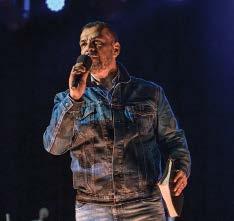

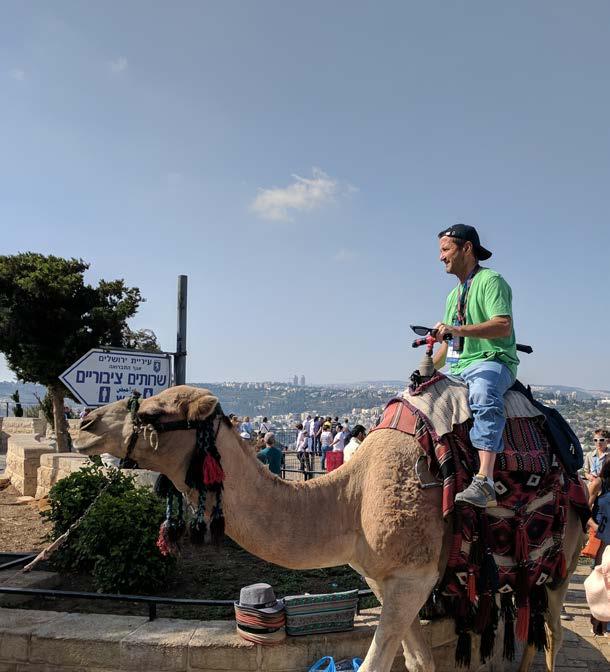
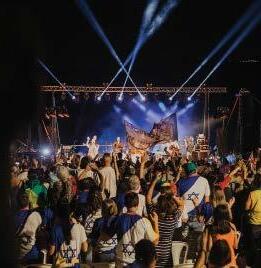


Two days in the Dead Sea Region • Three Days in Galilee Five days in Jerusalem • Parade of Nations Communion at Garden Tomb

Jerusalem March Worship, Praise, & Prayer in Israel


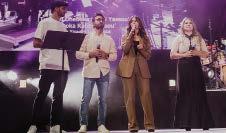

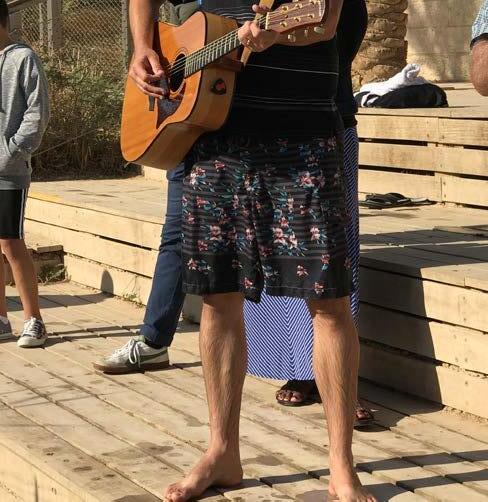

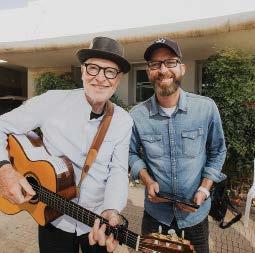

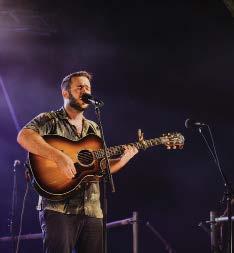

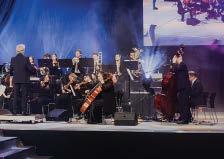



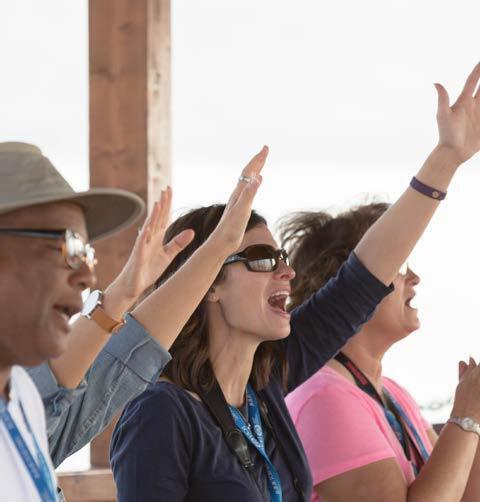
Psalm 47:7
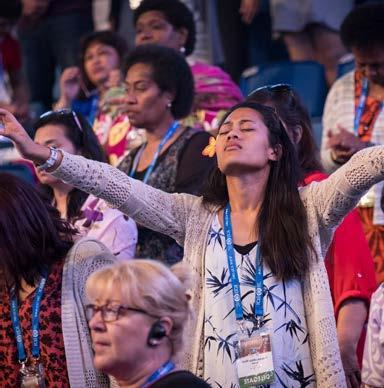
“For God is the King of all the earth; Sing praises with understanding.”
Travel to Israel for the Christian celebration of the Feast of Tabernacles and tour the land of the Bible. Join thousands of Christians from more than 90 nations to worship the King of kings in Jerusalem! There is no better time to visit Israel than during this Feast of the Lord! JOIN US FOR THE
us for the ICEJ
Feast
2023
Join
USA
Tour
www.icejusa.org/feast-tour















 BY ANNALIESE JOHNSON, ICEJ PUBLICATIONS / EVENTS REGISTRATION
BY ANNALIESE JOHNSON, ICEJ PUBLICATIONS / EVENTS REGISTRATION













 BY YUDIT SETZ, ICEJ DEPUTY AID DIRECTOR
BY YUDIT SETZ, ICEJ DEPUTY AID DIRECTOR








































